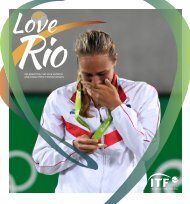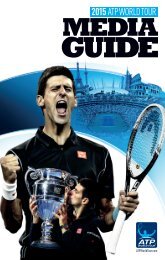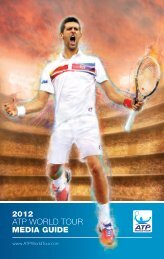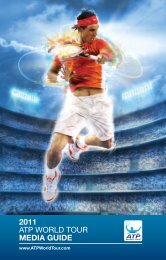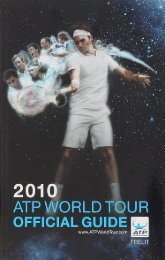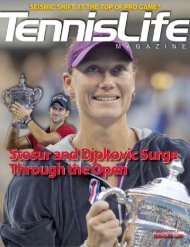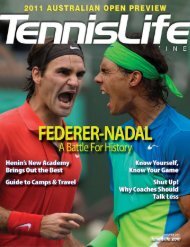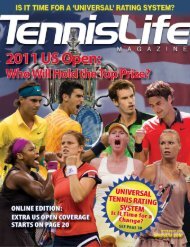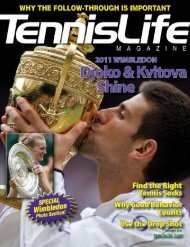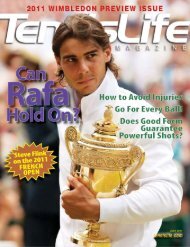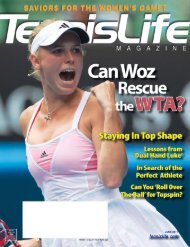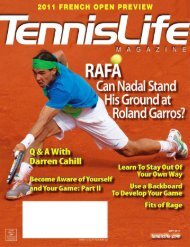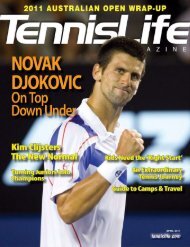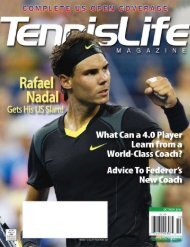A Champion's Mind - Pete Sampras
www.tennismoscow.me Insta:TENNISMOSCOW
www.tennismoscow.me Insta:TENNISMOSCOW
Create successful ePaper yourself
Turn your PDF publications into a flip-book with our unique Google optimized e-Paper software.
distraction that blunted my focus.<br />
Anger? I would have been faking it if I took to strutting around screaming, with the veins popping in my<br />
neck and my eyes bulging. As a kid, I threw the occasional tantrum, but as I became more of an attacking<br />
player and grew into a man, that behavior kind of dissipated somewhere along the way. It just comes to a<br />
point where you are who you are, and you recognize it. Pundits and fans sometimes wondered why I<br />
didn’t show more anger or emotion now and then, and the answer is simple: I didn’t feel it—or if you<br />
prefer, I didn’t allow myself to feel it; I internalized it instead.<br />
But I experienced frustration and felt the sting of criticism as much as anyone. I can keep score with the<br />
best of them when it comes to remembering who’s a friend and who’s a foe. I’ve got as much of a sense of<br />
justice and fairness as anyone, but I always subscribed to that old expression: Revenge is a dish best<br />
served cold.<br />
With rare exceptions, anger is an impediment to playing well and winning matches. I remember seeing<br />
Goran Ivanisevic lose it a few times in our many matches at Wimbledon. I would watch as he broke a few<br />
of his sticks, and at that point I always felt that I had him. The meltdown told me that I had broken my<br />
opponent’s composure and will. I now had him exactly where I wanted him.<br />
I also didn’t want anyone to be able to read me like that. By being opaque, I may have made some of<br />
my opponents a little more cautious and fearful. But that dynamic wasn’t an orchestrated strategy. I never<br />
tried to intimidate anyone, and I never played mind games. My biggest weapon was being myself; I<br />
showed that I could meet and handle the most nerveracking of situations in a calm, focused way—my<br />
natural way. Being cool with no frills or affectations won me a lot of matches.<br />
Early in my career, I marveled at the way John McEnroe would complain and stall, and suffer no<br />
repercussions in his game (in fact, he often played better when he was on his worst behavior). His<br />
outbursts didn’t bother me as much as they irked others, because I wasn’t easily distracted and always felt<br />
confident about how our games matched up.<br />
Andre Agassi sometimes lost it in our matches—I remember one year in San Jose, he cracked two<br />
rackets, fought with the chair umpire, and called him a “motherf#$@&%r.” Watching that happen, I sat<br />
back in my chair and thought, Okay, Andre’s finished.<br />
I tried very hard to keep everything simple, and that meant staying at arm’s length from many things,<br />
including nontennis relationships and activities that could distract me. I didn’t do many charity events or<br />
appearances, I didn’t respond to business overtures, I didn’t chase women. I felt I had to make certain<br />
sacrifices that others would or could not: I moved to Tampa and made it my home and base for most of my<br />
career because it was the best location for training, and it took me away from the distraction of friends<br />
and family in Southern California.<br />
But I missed my family—often powerfully—and didn’t especially enjoy training for the Australian<br />
Open in Florida during Christmas. Maybe I should have had someone to talk to about this stuff, a therapist<br />
or something, because putting on the blinders and internalizing everything, denying myself even the<br />
simple, harmless things like Cokes and cheeseburgers, being unable to talk to anyone about feeling<br />
vulnerable in my game, or being afraid to find outlets for my feelings of insecurity lest it water down my<br />
drive took a physical and mental toll.<br />
After I broke Connors’s record, I was free to focus on what most people thought was a greater task and<br />
more noteworthy accomplishment: besting Emerson’s record twelve Grand Slam titles. That required as<br />
much planning, work, determination, skill, and luck as any other goal, but it wasn’t as all-consuming an<br />
assignment. I could get that record without playing at the level I had set for myself over the last six years.<br />
From 1999 onward, I didn’t worry that much about the rankings, or my performance in sub–Grand Slam<br />
tournaments. Most of the regular tour events simply ran together in my mind, win or lose. At the same<br />
time, a whole new cast of rivals was emerging and I began to lose more matches.



